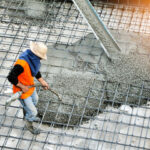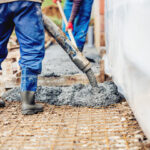Home » Posts tagged 'driveways'
Tag Archives: driveways
The Importance of Finding a Reputable Concrete Contractor
Concrete Contractors McKinney TX prioritize quality, safety, and timely completion of projects. They should be able to communicate clearly, work well with architects and engineers, and provide guidance and expertise throughout the construction process.
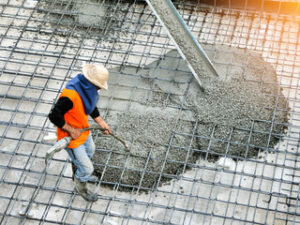
Site preparation is the first stage of any concrete project, which involves clearing debris and setting up forms and molds. This step is essential for shaping the final design of the concrete structure.
Concrete contractors use their expertise and craftsmanship to turn construction visions into a reality. They take blueprints and drawings, and develop a plan to execute the project, ensuring that all aspects of the concrete work are taken care of from start to finish. This includes interpreting plans and determining specifications, obtaining permits, estimating costs, and coordinating with other contractors and professionals involved in the construction.
A concrete contractor’s knowledge of the ins and outs of working with concrete helps them to complete projects on time and on budget. They also know how to avoid common pitfalls that can cost time and money, such as improper pours or incorrect finishes. They also understand the unique qualities of different types of concrete and can help clients select the best material for their project.
One of the most important traits for a concrete contractor to have is a passion for the craft. A strong desire to create something that is both enduring and beautiful drives them to do their best work. Concrete is not an easy material to work with, and it takes a lot of skill to make sure the finished product is up to standards.
Having strong communication skills is also important for a concrete contractor. They must be able to effectively collaborate with architects, engineers, and clients, and they should have the ability to lead a team of workers in the field. Additionally, concrete contractors must be safety-conscious and have a strong commitment to following protocols and regulations to prevent injuries or property damage on the job site.
When selecting a concrete contractor, it’s essential to look at their portfolio and past projects. Find out how long they have been in business and what their previous clients have said about their work. Additionally, ask for a list of references and check their licenses and insurance coverage to ensure they are qualified and compliant with local regulations.
When hiring a concrete contractor, be sure to compare prices and services offered to find the right fit for your project. Look for a company that offers quality work, has years of experience, and is licensed and insured. Lastly, make sure to read reviews and check with friends and family for recommendations.
They Perform Maintenance
Concrete contractors are not only responsible for creating a foundation, slab or walkway, but they also perform ongoing maintenance and repairs on these structures. Their work helps ensure the durability and safety of both residential and commercial properties. This is why finding a professional, experienced concrete contractor is so important.
When selecting a concrete contractor, examine their portfolio for previous projects and review online reviews. Taking these steps will help you find a contractor who has the skills to meet your needs and the expertise to ensure your project is completed on time and within budget. In addition, it is crucial to look for a contractor who displays professionalism and provides quality customer service.
Having the proper licensing and certification is another important consideration when hiring a concrete contractor. Licensing requirements vary by state, but generally they include an exam, background check, references, and a bond. To verify a contractor’s credentials, contact their licensing agency and ask for a copy of their license or certificate.
Once you’ve found a reputable contractor, it’s a good idea to get a detailed contract for the project. This document should outline the project details, timelines, costs, warranties, and terms of service. It is important to review the contract carefully to make sure you understand all of the responsibilities and commitments of both parties.
Regular maintenance can help extend the life of concrete surfaces and minimize costly repair services in the future. In fact, addressing minor issues early can prevent deterioration and other serious problems from developing. For example, resealing a sidewalk or driveway every three years can protect the surface from weather damage and keep it looking new.
A passion for concrete and a dedication to providing high quality work are essential traits for a successful concrete contractor. Additionally, this profession requires a strong attention to detail and the ability to manage the complexities of construction projects. It is also a good idea for concrete contractors to carry general liability insurance, which can provide coverage for third-party bodily injury or property damage claims as well as legal fees.
They Perform Repairs
Concrete contractors are specialized professionals who handle the construction and repair of concrete structures. They know how to build and maintain these structures so that they are structurally sound, safe, and look professional. They are also able to conform to building codes and ensure that their work is high-quality. If you are planning to hire a concrete contractor, make sure you review their credentials and ask for references from previous clients. You can also use online reviews to assess the quality of their work.
The deterioration of concrete surfaces is inevitable, and repairs are necessary when cracks and other damage occur. Whether they are caused by soil erosion, poor installation, or heavy traffic, these issues can cause problems with the function and aesthetics of your property. Professional contractors have the experience to identify the underlying issue and determine the best course of action for repair.
Whether you need to repair a sidewalk, patio, or driveway, it is important to choose the right concrete contractor for the job. A qualified contractor will be licensed, insured, and will have extensive experience handling a variety of projects. They will also have the proper equipment and knowledge to complete the project quickly and efficiently.
Once you have selected a contractor, be sure to request a written contract before beginning the project. This document will outline the scope of work, timelines, costs, and warranties. A well-written contract will protect your interests and help prevent disagreements down the road.
It is also a good idea to ask potential contractors about their warranty policies. A company that stands behind its work will offer a detailed warranty that covers workmanship and materials. This is a sign of confidence in the quality of their services and shows that they are willing to go above and beyond to guarantee customer satisfaction.
Hiring a professional concrete contractor can save you time, money, and headaches in the long run. These experts specialize in their craft and have the necessary tools to ensure that your concrete project is done correctly the first time. In addition, they will have extensive industry expertise from hundreds or thousands of past projects and can recommend the best strategies for your specific needs.
They Perform Structural Repairs
Concrete contractors perform a variety of repairs and maintenance tasks to extend the life of concrete structures. They may repair surface cracks and other minor damage using epoxy injection or a concrete overlay, or they can restore structural integrity to damaged or degraded concrete through structural reinforcement or resurfacing. They also install drainage systems to address problems with water pressures beneath floors or behind walls, and they ensure that concrete is properly cured to prevent future structural issues.
Choosing a reputable concrete contractor requires research and careful consideration. Look for a company that prioritizes clear communication and provides transparent quotes. Ask to see examples of their previous work and discuss the types of projects they’ve worked on, paying special attention to any structural repair or renovation work. Ideally, your contractor should be able to provide references from other local homeowners with similar construction needs and a history of satisfactory work.
Aside from addressing cracks and other cosmetic issues, concrete contractors can also improve the durability of a home’s patios, driveways, sidewalks, and pool decks. They can help ensure that these structures are properly poured to prevent structural instability, and they can add decorative touches to enhance the visual appeal of these outdoor living spaces.
When choosing a concrete contractor, it’s important to consider their experience and technical expertise. A seasoned contractor understands the unique challenges that come with each installation project and can anticipate any potential problems before they arise. They should be able to collaborate effectively with architects, engineers, and other professionals in the construction industry to develop concrete construction plans and specifications that meet the requirements of each project.
When choosing a concrete contractor, it’s crucial to find a team that is dedicated to the safety of themselves and their clients. A reliable team will take the time to review and update their safety policies regularly to ensure that they are compliant with industry regulations and best practices. This helps to ensure that their employees are safe while on the jobsite and that their clients can expect a high standard of quality when it comes to the installation or repair of concrete structures at their homes or places of business.
The Importance of Concrete Contractors
Concrete Contractors Greensboro NC are specialized tradespeople who work on a variety of construction projects. They have extensive hands-on experience with pouring, finishing, and repairing concrete structures.
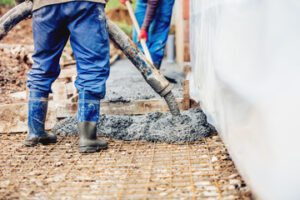
They also possess technical expertise and knowledge of building codes, regulations, and industry standards. They stay updated on innovative techniques and offer clients creative solutions for their unique project requirements.
Concrete is the most versatile construction material on the market. It can be used in a wide variety of applications, and professional concrete contractors are crucial for the safety, integrity, and beauty of any concrete project. Concrete contractors are more than just pouring cement; they’re experts in transforming construction visions into tangible realities. They are passionate about their craft and have a dedication to quality that goes beyond just building structures.
The concrete industry is not only a powerful business, but also a fun and exciting one. Contractors love what they do and are proud to share their knowledge with others in the industry. They aren’t afraid to step outside the box and try new methods, materials, and tools to improve their work. They also enjoy collaborating with clients and forming lasting relationships in the process.
Contractors are no stranger to the spotlight either, with a number of television shows featuring them. Many people grew up watching Norm Abram build masterpieces on This Old House or tagged along as the This Week at Home crew solved plumbing, landscaping, and electrical problems for homeowners. The more recent Concrete Combat is a fantastic show that celebrates concrete professionals and fills a gap in media representation of the trades.
A passion for the craft of concrete is at the core of every Baker Concrete project, too. Their commitment to quality, customization, and architecture enables them to transform environments that inspire. The team at Baker Concrete takes pride in bringing their clients’ dreams to life, and they do it by prioritizing precision and craftsmanship. This dedication extends far beyond the job site as Baker Concrete has a strong philanthropic focus on the community.
Expertise in Working with Concrete Materials
A passion for concrete and a strong desire to create durable and visually appealing structures are fundamental qualities that underpin the success of commercial concrete contractors. They have a deep understanding of the concrete materials used in their work and are familiar with all applicable building codes and regulations. In addition, they are able to work with architects and engineers to ensure that the final product meets design specifications and is built to last.
When choosing a concrete contractor, it’s important to clearly define your project requirements and budget. A good contractor will be able to provide you with a detailed breakdown of costs including labor, materials, permits, and other expenses. They should also be able to give you an accurate estimate of how long the project will take and any potential issues that may arise.
Look for a concrete contractor who has a solid track record of completing projects on time and within budget. Ask for a portfolio of their past works and pay close attention to the quality of finish, precision in construction, and overall aesthetics. You can also check out some of their previous projects in person or request a list of references that you can contact to learn more about their work and experience.
It’s also a good idea to verify the contractor’s credentials and insurance coverage before hiring them. Licensed contractors have met all the necessary requirements to operate legally, while insurance covers any accidents or damage that might occur during the course of the work. Some concrete contractors also hold certifications from material suppliers that demonstrate their expertise and familiarity with specific types of products or installation techniques.
Finally, look for a concrete contractor who offers warranties and guarantees on their work. This is an excellent way to protect your investment and ensure that the finished project will be free from any defects or problems that might arise after it’s completed. This is particularly important if you’re investing in a large-scale project that will be used for business purposes. Choosing a reputable concrete contractor that stands behind their work is a smart move that can save you money in the long run by preventing costly repairs and replacements.
Experience
Concrete professionals have extensive industry experience, often garnered from hundreds or even thousands of past projects. This means they have an in-depth understanding of the best strategies to complete your project correctly and efficiently. They also have the knowledge to anticipate potential challenges, and they can quickly find solutions to overcome obstacles. This allows them to meet project deadlines without sacrificing quality or safety.
Ask a potential commercial concrete contractor to provide you with a portfolio of projects completed in the past. Examine their work carefully to assess the craftsmanship, attention to detail, and overall aesthetics. Pay special attention to projects that are similar to yours, as these can help you determine their capabilities and the level of expertise they offer.
Look for a concrete contractor that offers a warranty on their services. A warranty shows that they have confidence in their abilities and are willing to stand by their work. It’s also a sign of their commitment to customer satisfaction and to addressing any issues that may arise after the completion of a project.
When evaluating potential concrete contractors, make sure they have the proper licensing and certifications. In addition, be sure they are insured and carry workers’ compensation insurance in case of any injuries or property damage on the job site. You should also inquire about their safety practices, and ensure they adhere to all local building codes and regulations.
An experienced commercial concrete contractor will have a strong working relationship with architects, engineers, and other construction professionals. This teamwork is essential to the success of your project. They can help you create a design that meets your specifications and works within your budget. They can also advise you on the best materials and techniques to use, ensuring that your finished product is safe and durable. Their expert advice can save you time and money on the long run. Lastly, their knowledge of local building codes and regulations can help you avoid costly fines. They can also navigate the complex permit process with ease. This is a major benefit, as it can reduce the amount of time you spend waiting for approval from the city.
Commitment to Quality and Safety
Concrete contractors must understand the importance of building with quality in mind. This is why they carefully select the raw materials needed to make sure that the end result meets industry standards and will last a long time.
In addition, a reliable contractor always takes safety into consideration and complies with all relevant regulations. They are also accountable for their mistakes and will always find a way to resolve them properly. This shows that they are truly invested in their work and take pride in delivering high-quality results on all of their projects.
Choosing the right commercial concrete contractor is a crucial decision that affects the overall project success. Look for a contractor with proper licensing and certification, a diverse portfolio of past projects, and a commitment to transparent communication and accurate cost estimates.
When evaluating potential contractors, be sure to review their online reviews and testimonials. This will give you an idea of what past clients have experienced with them. It is also a good idea to ask them about their safety policies and procedures in case you plan on working with them for a commercial project.
In addition to these qualities, an exceptional contractor should be able to provide clear explanations and professional advice throughout construction. This will help you to understand the processes involved and how they will impact your construction schedule. They should also be able to identify any issues that may arise and offer solutions before they escalate into costly delays and rework.
Streamline your construction process with Construsoft’s smart software. With an accurate and information-rich 3D BIM model, you can reduce risks, save on costs, and deliver a more successful project. With streamlined planning and precise quantity take-offs, you can get the job done quickly and efficiently without sacrificing quality.
Concrete projects are complex and involve multiple steps. They require the careful selection of materials and a detailed understanding of construction methods to ensure that the final product is safe, durable, and meets all relevant specifications. That’s why it is important to choose a concrete contractor who has the knowledge and experience necessary to complete your project on time and within budget.
What is Concrete and How Does it Durable?
Concrete is one of the world’s most commonly used building materials. It is durable and stands up to moisture, heat and other harsh elements.
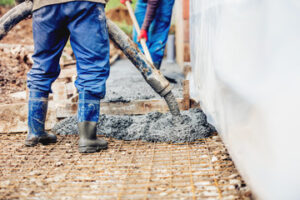
It is made from air, water and cement, along with fine aggregates like sand and coarse aggregates such as rocks. It can be molded into any shape before it hardens, making it ideal for use in many applications.
Concrete is one of the most durable construction materials available. It can withstand high levels of compression and resist bending, making it suitable for use in load-bearing structures such as buildings and bridges. It can also be reinforced with steel rebar and fibers to strengthen it further and increase its tensile strength. This makes it an excellent choice for paving roads and driveways, where its strength will allow them to withstand the weight of vehicles and weather conditions.
The strength of concrete depends on its density and the size and shape of the aggregates used in its composition. It is also influenced by the water content of the mixture, and the ratio between cement and aggregates. The water content is important because it determines the concrete’s workability. Too little water will not fill the voids between the aggregates, and too much will lead to segregation. Concrete with low workability will not be easy to place, and it may lose its strength during the curing process.
A good concrete mix is a balanced mixture of coarse and fine aggregates. Aggregates are granular materials that add bulk and help the concrete bind together. They can be coarse, such as gravel or crushed stone, or fine, like sand. The type of aggregate used in a concrete mixture is determined by its purpose. For example, if the concrete is to be used as a footing for a wall, then coarse aggregates should be used.
Concrete is usually poured into forms to create specific shapes, and then left to cure for several days. However, it is possible to make concrete with higher strength in a shorter period of time using special admixtures. This type of concrete is called rapid-strength concrete, and it can be poured into place within hours instead of the usual two days. This type of concrete is often used for construction in colder climates or when construction can’t take place during the summer, as it can withstand harsh weather conditions.
Concrete has been used in construction for millennia and is still widely used today. Its strength and durability make it an ideal construction material for commercial and residential projects. It is also used in a variety of large-scale paving projects, including highways and roads.
Durability
Concrete is a durable material that can stand up to harsh environmental conditions and other forces. However, its durability depends on the design and construction of the structure. It is important to carry out regular durability tests to ensure that the concrete will perform well in the long term. This will help you avoid any future problems with your construction project in Saudi Arabia.
A proper mix design is essential for ensuring concrete’s durability. Mix design influences both the porosity and permeability of the material. Porosity is the volume of openings, or pores, in the material, and permeability measures how easy it is for fluids to pass through the concrete. Concrete mixes should be designed to reduce their permeability and porosity, while maintaining their desired engineering properties.
Chemical Resistance
Durable concrete is capable of withstanding a wide range of chemicals, including chlorides and other oxidizing agents. This feature makes it an excellent choice for industrial applications. Its durability also helps protect against freezing and thawing cycles, deicing chemicals, and other common environmental hazards.
In addition to its durability, concrete is a cost-effective building material. It is easy to sculpt and can be used in a variety of applications. In commercial buildings, it is used to create walls and floors that offer a quiet and secure environment for occupants. Its ability to withstand high loads also makes it a good choice for heavy-duty projects.
Premature deterioration of concrete structures costs billions of dollars annually worldwide. This problem can be caused by the use of inappropriate materials, poor construction practices, and insufficient curing. To prevent these issues, you can improve the durability of your concrete by following these tips:
The Silver Bridge catastrophe serves as a reminder of the importance of maintaining high standards in concrete construction. The loss of lives and property underscores the need for meticulous engineering and quality materials. Fortunately, advances in concrete technology can make it more resistant to abrasion and other environmental factors. This will help preserve our cultural legacies and build cities that are more resilient to natural disasters.
Flexibility
Concrete is a versatile construction material that can be used to construct a wide range of structures. It is strong, durable and easily formed into different shapes and sizes. In addition, it can withstand the most intense weather conditions including earthquakes, typhoons, hurricanes and tornadoes. It is also environmentally friendly and cost-effective. In addition, it can be poured in place, making it an ideal choice for large-scale construction projects.
Concrete can be used in many applications such as pavements, kerbs and floors. Its high compressive strength makes it a preferred material for building foundations and towering skyscrapers, as well as bridges, roads and railways. It is also used for commercial paving, sidewalks and drainage culverts. In fact, it is the most common construction material in the world.
In general, concrete is a combination of aggregates (typically natural sand and gravel or crushed rock) bound together with a hydraulic binder e.g. Portland cement and activated by water. When cured, it forms a dense semi-homogenous mass that is extremely strong in compression and very weak in tensile stress. Consequently, for applications where tensile stresses must be accommodated, reinforcement is added to the concrete.
However, while ductile materials are characterized by the existence of a linear elastic-deforming regime and an almost-linear inelastic strain-hardening regime, concrete is brittle. This is because most attempts at improving its tensile strength have focused on eliminating flaws instead of introducing energy dissipation mechanisms.
Recent developments in the field of concrete technology have made it possible to produce a highly resilient and acoustically-efficient material, known as self-compacting concrete (SCC). It is a form of concrete that can be shaped by hand or by machine, which allows for greater flexibility in structural design. This new type of concrete also reflects heat, instead of absorbing it, which can save energy and money on utility bills. Moreover, this type of concrete can be used to build buildings and other structures that require a high level of insulation. It can be easily adapted to the specific needs of each project, and it is more cost-effective than other construction materials.
Cost
Concrete is one of the most commonly used construction materials because it provides stability and strength to large structures such as high-rise buildings and dams. It is also fire-resistant, making it a safe choice for commercial and residential construction. It is also very cost-effective and can withstand harsh weather conditions. Concrete is made of a mix of dry ingredients including sand, gravel, and crushed stone, which are then mixed with water to form a paste or batter. It is then poured into molds or frames and allowed to set and cure, which can take weeks.
Concrete has been used for thousands of years in various applications. It is a versatile material that can be molded into different shapes and sizes. It is also easy to work with, which makes it a preferred building material. It can withstand high temperatures and blazing flames, which makes it ideal for use in fire-resistant projects. Concrete can also withstand high amounts of pressure, which is a vital feature for any construction project.
Its compressive strength makes it a popular choice for paving major roads and highways. It is also used in commercial parking lots, sidewalks, and other walkways. In addition, it is a good choice for building industrial and utility infrastructure. Its durability and strength ensure that these structures will last for a long time.
The production of concrete involves a number of processes that can be energy-intensive and cause environmental impacts. However, there are many ways to reduce the environmental impact of concrete production. For example, some concrete manufacturers use recycled aggregates instead of traditional quarry rock. Additionally, some manufacturers employ aeration techniques to reduce the amount of air pollution produced during concrete production.
Concrete is a simple, non-toxic building material that can be shaped into a wide variety of structural forms. It is comprised of a combination of aggregates (such as natural sand, gravel, and crushed stone) and a hydraulic binder such as Portland cement. In addition, concrete can be reinforced with steel bars to withstand tensile stresses. Concrete can also be textured and colored to achieve unique architectural designs.

